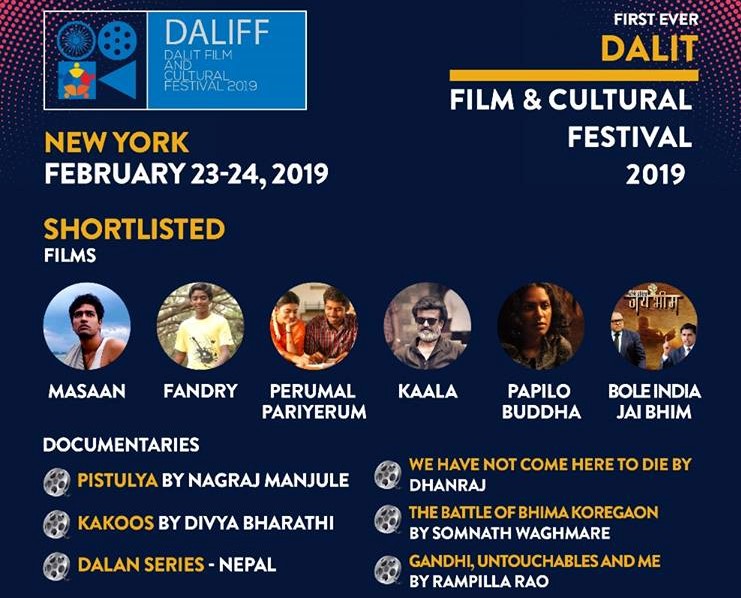For the first time at an international level, a Dalit Film and Cultural Festival will happen at Columbia University, New York on February 23 and 24 this year. The festival will screen twelve films in languages like Tamil, Marathi, Malayalam, Hindi, and a Nepali series. All selected films will focus on Dalit assertion and identity amidst violence.
The six feature films include Pariyerum Perumal by Mari Selvaraj and Kaala by Pa Ranjith in Tamil, Papilo Buddha by Jayan K Cherian in Malayalam, Masaan by Neeraj Ghaywan in Hindi, Fandry by Nagraj Manjule and Bole India Jai Bhim by Subodh Nagdeve in Marathi.
The six documentaries include director Dhivya Bharathi’s Kakkoos, Deepa Dhanraj’s We Have Not Come Here To Die, and Gandhi, Untouchables and Me by Rampilla Rao. Also featured are Pistulya by the Marathi filmmaker Nagraj Manjule, The Battle of Bhima Koregaon by Somnath Waghmare, and Dalan Series from Nepal.
All the films to be screened were made in the last decade. Kakkoos is about the lives of manual scavengers in different parts of Tamil Nadu. 26-year-old Divya made the film after two workers employed as manual scavengers died when they inhaled poisonous gas from a septic tank. The film looks at how the job is rooted deeply in the caste system.
Deepa Dhanraj started making We Have Not Come Here To Die after the death of the Dalit PhD scholar Rohit Vemula in 2016. The film focuses on the mood at the University of Hyderabad that year, and how students across the country spoke about their experiences of caste discrimination in universities leading to a strong anti-caste movement.
Marathi film Pistulya, made in 2009, is about a young Dalit boy who wants to go to school, and his parents try all means to give him an education. Gandhi, Untouchables and Me is a short film that was written as a play by Rampilla Rao from Vijaywada. The film looks at his participation in Dalit protests at JNU.
The Battle of Bhima Koregaon is a documentary that looks at the history and significance of the annual gathering of Dalits at Bhima Koregaon near Pune. It is in honour of the 500 Mahar soldiers who joined the British forces and defeated the Peshwa rule in 1818.
Dalan Series was a popular show that used to air in Nepal TV every Saturday. It was based on the people living in the hills around Kathmandu and other parts of Nepal, and focused on the problems faced by landless labourers who were repeatedly abused and ill-treated by landed castes, and how the situation has been the same for years now.
Pa Ranjith’s Kaala which released last year, was about the Tamil migrants settled in the chawls of Dharavi. Lead by Rajinikanth’s Kaala, the people living in the slums fight the government who tries to evict them and get their land. Later in the year, Pariyerum Perumal released. It was directed by Mari Selvaraj and produced by Pa Ranjith, and was about actor Kathir’s Pariyerum Perumal who goes to a government college to study law, and begins to perceive the stark societal reality that awaits him.
Recommended
Papilo Buddha, a 2013 Malayalam film written and directed by Jayan Cherian, was about the atrocities committed against Dalits, and women in particular, in and around Wayanad in Kerala. The film also cast 150 Adivasis from the area and spoke about how their environment and lives were suppressed by the locally powerful people.
Masaan by Neeraj Ghaywan and Fandry by Nagraj Manjule were feature films about inter-caste love and opposition faced by families and society alike. Bole India Jai Bhim by Subodh Nagdeve is a biopic about the life and work of Hardas Laxman Rao Nagrale, a Dalit social reformer and supporter of BR Ambedkar.
This is the first edition of the Dalit Film and Cultural Festival, and it will happen at Columbia University, where BR Ambedkar studied, on February 23, and The New School of New York on February 24. The chief guests for the event are directors Pa Ranjith, Nagraj Manjule, and actor Niharika Singh.



